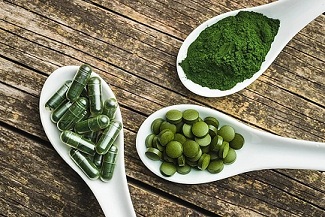Study By Israeli Scientists Shows That Spirulina Algae Reduces Mortality Rates In COVID-19 Patients
Source: Spirulina Algae And COVID-19 Feb 28, 2021 4 years, 1 month, 3 weeks, 5 days, 7 hours, 53 minutes ago
A new study led by researchers from MIGAL-Galilee Research Institute-Israel and also involving scientists from MATIS-Food and Biotech Research and Development-Iceland and the University of Cambridge-UK shows that
spirulina algae is able to reduce mortality rates in COVID-19 patients besides reducing inflammation.

According to the study abstract, “An array of infections, including the novel coronavirus or SARS-CoV-2, trigger macrophage activation syndrome (MAS) and subsequently hypercytokinemia, commonly referred to as a cytokine storm (CS). It is postulated that cytokine storms are mainly responsible for critical COVID-19 cases, including acute respiratory distress syndrome (ARDS). Recognizing the therapeutic potential of Spirulina blue-green algae (Arthrospira platensis), in this in vitro stimulation study, LPS-activated macrophages and monocytes were treated with aqueous extracts of Spirulina, cultivated in either natural or controlled light conditions. The study team reported that an extract of photosynthetically controlled Spirulina (LED Spirulina), at a concentration of 0.1 µg/mL, decreases macrophage and monocyte-induced TNF-α secretion levels by over 70% and 40%, respectively. The study team proposes prompt in vivo studies in animal models and human subjects to determine the putative effectiveness of a natural, algae-based treatment for viral Cytokine Storms and ARDS, and explore the potential of a novel anti-TNF-α therapy."
The study findings were published in the peer reviewed journal: Marine Biotechnology.
https://link.springer.com/article/10.1007/s10126-021-10020-z
The study team showed that an extract of spirulina algae has the potential to reduce the chances of COVID-19 patients developing a serious case of the disease.
The study findings demonstrated that an extract of photosynthetically manipulated Spirulina is 70% effective in inhibiting the release of the cytokine TNF-a, a small signaling protein used by the immune system.
The study was conducted in a MIGAL laboratory in northern Israel with algae grown and cultivated by the Israeli biotech company VAXA, which is located in Iceland.
The biotech company received funding from the European Union to explore and develop natural treatments for coronavirus.
The Iceland’s MATIS Research Institute also participated in the study.
It is known that in a small percentage of patients, infection with the SARS-CoV-2 coronavirus causes the immune system to release an excessive number of TNF-a cytokines, resulting in what is known as a cytokine storm. The storm causes acute respiratory distress syndrome and damage to other organs, the leading cause of death in COVID-19 patients.
Dr Asaf Tzachor, a researcher from the IDC Herzliya School of Sustainability and the lead author of the study told Thailand Medical News, “If you control or are able to mitigate the excessive release of TNF-a, you can eventually reduce mortality.”
Interestingly during cultivation, growth conditions were adjusted to control the algae’s metabolomic profile and bioactive molecules. The res
ult is what Tzachor refers to as “enhanced” algae.
Dr Tzachor said that despite the special growth mechanism, the algae are a completely natural substance and should not produce any side effects.
To date, Spirulina is approved by the US Food and Drug Administration as a dietary substance. It is administrated orally in liquid drops.
Dr Tzachor added, “This is natural, so it is unlikely that we would see an adverse or harmful response in patients as you sometimes see in patients that are treated with chemical or synthetic drugs.”
Spirulina have been shown to reduce inflammation. Dr Tzachor said that if proven effective, spirulina could also be used against other coronaviruses and influenza.
It should also be noted that the common flu also induces a cytokine storm in certain individuals.
Dr Dorit Avni, director of the laboratory at MIGAL added, “If we succeed in the next steps, there is a range of diseases that can be treated using this innovative solution as a preventative treatment or a supportive treatment. Moreover, because it is a treatment against the effect of the virus on the body, its impact should not be affected by virus mutations.”
MATIS’s Dr Sophie Jensen also added, “In this study, it was exciting to discover such activity in algae that was grown under controlled conditions, using sustainable aquaculture methods. Although active ingredients have not yet been identified with absolute certainty, the extract opens a space for clinical trials that offer a variety of anti-inflammatory treatments, for COVID-19 and beyond.”
Dr Tzachor said that the team now hopes to run human clinical trials.
He said, “If clinical trials confirm the efficacy of our suggested therapy at the rates reported, the substance can become available to the general population. We hope this research would urge the communities of regulators and investors and pharma companies to invest more resources and give more attention to natural-based therapies. The potential is unbelievable.”
As the COVID-19 pandemic continues to wreak havoc around the world and with new emerging variants expected to take the pandemic into a more scary scenario despite the ongoing COVID-19 vaccinations programmes, experts are desperately looking for new therapeutics to help deal with the various aspects of the COVID-19 disease and many are turning to herbs, phytochemicals and other natural protocols.
For more on
Spirulina and COVID-19, keep on logging to Thailand Medical News.
